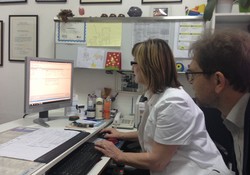Homegrown, low-cost innovation improves NCD treatment in Croatia

Triin Habicht
Software originally developed by local doctors now makes treatment of NCDs more efficient across all of Croatia
An innovative electronic registering system allowing systematic recording and management of data on patients with noncommunicable diseases (NCDs) has made health care in Croatia more efficient at a low cost.
The integrated health information system, known as “primary care panels”, now covers 3.8 million adults in Croatia and has resulted in better management of chronic conditions, fewer secondary complications and fewer patients who require a consultation with a specialist.
“Patients get better care”
NCDs – cancer, cardiovascular disease, diabetes and chronic respiratory disease – are the number 1 cause of mortality in Croatia and with the growing burden of diseases and costs, the improvements in care due to the electronic panels are much welcomed.
Croatia, like many other countries, has had inadequate registration of people with chronic conditions. Introduction of the panels has improved management of NCDs in primary care units.
Altynai Satylganova, who works with the Health Service Delivery Programme in the Division of Health Systems and Public Health at WHO/Europe, has seen the panels in action. “Every GP [general practitioner] has limited time with each patient, and usually a lot of that time is taken up by filling out forms and paperwork. This system makes that part faster, which means that patients get better care.”
She explains that the better care not only stems from doctors getting more time with their patients, but also from built-in calculations of indicators, such as 10-year risk for acute cardiovascular diseases, and automatic reminders for follow-ups.
Improving NCD management
“Primary care panel” is a common name for software tools that allow doctors to store and access patient information synchronized in real time and linked to medical records from hospitals and labs.
The panels were pilot-tested for 8 months during 2012–2013 in selected facilities across Croatia, and were shown to improve risk stratification and management of NCDs. After release of the results of the pilot study, country-wide use of primary care panels spread rapidly, with uptake in almost all family practices by the end of 2014.
More time and less referrals
The panels are designed to be easy and intuitive to use, so no additional training of health-care professionals has been necessary in the implementation of the system.
Among other results, use of the panels has improved the overall efficiency of GP consultations, allowing more time to provide advice on lifestyle and ensure compliance with treatment. This, in turn, has resulted in fewer referrals to specialists. In 2012, before the introduction of the panels, 22.95% of all patients with diabetes were referred to a specialist, 4 years later that number had dropped to 16.42%.
Local innovation
The prototype for the electronic panels was developed by a group of GPs working in the town of Breznica. Recognizing the good practice, the Public Health Institute of Croatia started a national pilot project that led to nationwide implementation.
Altynai Satylganova points out that the local approach to new innovations often creates more viable solutions: “Often data collection is detached from the health-care delivery system, so data is collected but not necessarily used. This is an information system that is designed with the needs of health service providers in mind”.
An inspiration to other countries
Croatia has struggled with high rates of premature mortality from major NCDs, and a high share of specialist consultations (23% of all ambulatory visits) indicated that patients with and at risk of NCDs should be better managed in primary care.
Introduction of the primary care panels has contributed to lowering the share of referrals to specialists to 16.5%.
As many countries in the eastern part of the WHO European Region face the same problem and are adopting solutions to better manage patients with and at risk for NCDs, the experience of Croatia might be useful.
Expansion at marginal cost
Since the nationwide introduction of primary care panels in 2013, several additional modules have been added to support the needs of elderly patients, such as managing polypharmacy.
These were added at marginal cost, by building them into the existing software. The latest plans are to use the data to look at specific disease and risk factor registries, and to add a tool for real-time monitoring of NCD risk factors.
This is one of the many examples of good practice which will be shared at the high-level regional meeting Health Systems Respond to NCDs on 16–18 April in Sitges, Spain. The meeting will bring together evidence and experience of how governments can adapt their health systems to effectively meet the growing challenge of NCDs.



